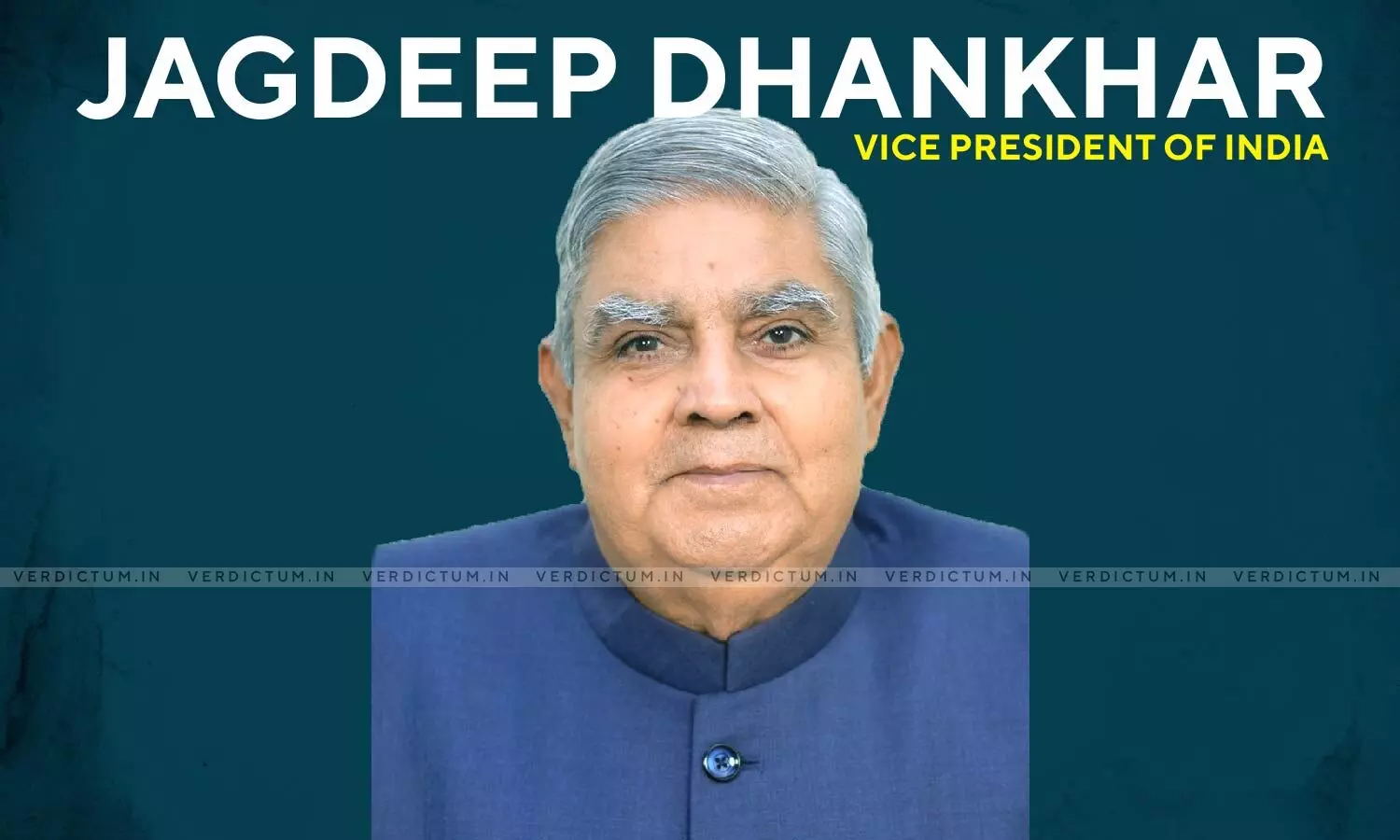
Responsibility Of Parliament To Safeguard Cultural Integrity, Parliament Alone Is In Charge Of Legislation: Vice President
 |
|The Vice President of India Jagdeep Dhankar while addressing the audience at the inauguration of the Civil Services Day, 2023 in New Delhi on April 20 said that it is the responsibility of the Parliament to safeguard India’s national sovereignty and cultural integrity, from any kind of threats, internal or external.
He said, “It is the responsibility of the Parliament to safeguard India’s national sovereignty and cultural integrity, from any kinds of threats internally or externally. … Have my assurance - Parliament alone is ‘incharge of legislation’ and competent to enforce it. Legislation is the exclusive preserve of the Parliament, the most authentic reflector of the will of the people at large.”
He remembered Sardar Vallabhbhai Patel, the ‘Iron Man of India’ who referred to the civil servants as the ‘steel frame of India’.
“Vision of the Sardar- the Unifier of Modern India, continues to inspire and motivate civil servants, as also all of us across the country to make exemplary contributions for the nation. It is our collective ‘dharam’ to always keep the interest of Bharat uppermost”, said the Vice President.
He further asserted that ‘Nation Always First’ has ever to be our guiding principle and those out of line need to reflect and revisit their thought process as anything otherwise will be antithetical to our nationalism.
“It is also heartening to see that more and more talented young women are joining the civil services, ready to face the challenges of public administration. Their presence will be wholesome and will lead to a more sensitive and well-rounded bureaucracy. … Vision and policies of the political executive are quintessential to optimising your performance and exploitation of your talent and potential. Fortunately, this today is a ground reality with there being an environment for optimal output”, he said.
He pointed out that it is a constitutional imperative that there should be uniformity in administration across the Union and States so that federalism blossoms into cooperative federalism as envisioned by Prime Minister Narendra Mod and in this emergence, Civil service has a critical role to play.
“Some bureaucrats at the state level are turning out to be a real challenge to politicians. They wield more power that can be the envy of any politician. This needs to be introspected and counselled so that this falls in line with the spinal belief the civil service has, and with the reputation it has nurtured over the decades. … Scrupulous adherence to the All India Services (Conduct) Rules, 1968 and related legal regime is not optional. … Functioning in harmony and togetherness between the Centre and States is a constitutional imperative and in this the civil service plays a pivotal role by exhibiting scrupulous adherence to conduct legal regime”, he said further.
He also pointed out that in the 1980's when he was an advocate, he could never have a sound sleep unless his name appeared in the press and that over a year, he became a senior advocate and learned that this was not the right thing.
“You belong to the most distinguished category of Human resource, and there is no one in the country who can say I never aspire to hold your position. I would therefore say, the Media bug has afflicted some in the civil service and there is need for systemic guidance by your structured associations. … Bureaucracy suffers in natural course interventions from Legislature, Judiciary and political executive. In my capacity as Chairman, Rajya Sabha, I have structured it”, he observed.
He further asserted that the Doctrine of Separation of Powers has to be observed if our democracy is to blossom and sustain. He said that we are the largest and mother of democracy and that our democracy is most functional and vibrant at all levels - the village, the municipalities, the states, and at the centre.
“In no other constitution of any other country, you will find a provision for panchayats, municipalities. We have it in our part IX of the Constitution. This kind of hierarchical democratic mechanism is nowhere else in the world. … Our level of freedom of expression is next to none and there is no tangible reflection of enforced silence. … It is indeed painful to suffer some who adopt an ostrich stance to our phenomenal growth and flourishing democratic values. In and out of the country they engage in misadventure to demean, decry, taint and tarnish our democracy and constitutional institutions”, he said.
He also observed that dangers are emanating from outfits, within and without, including some foreign universities doubling up as centers of subversive anti-Bharat activities out to demolish our civilisation ethos and sully and muddy our growth and that disturbing insights in the hidden agenda of the so-called elites in India is alarming and unfortunately getting reflected in our constitutional institution working.
“Under our constitutional scheme neither the Legislature nor the Judiciary can emerge as a powerful political actor- this is best left to the political class. … I have full trust and belief in your intellect and capacity to reach and outreach as influencers to neutralise anti-Bharat narratives and to effect execution of policies of the Government and visionary leadership”, he concluded.
In January this year, the Vice president had criticised the Supreme Court for using the doctrine of basic structure to strike down the constitutional amendment that introduced the National Judicial Appointments Commission. He had said that the Kesavananda Bharati judgment of 1973 set a bad precedent.
The Bombay High Court had held that fair criticism of a judgment is permissible, while dismissing a PIL against the Vice President for his remarks against the Basic Structure Doctrine.